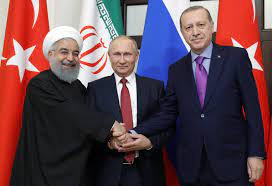
Putin and Middle East Leaders. Foto sources : CBS News
STRATEGIC ASSESSMENT. As the war in Ukraine nears its eighth month, Russian President Vladimir Putin remains a pariah for many in the international community, for the initial invasion in February and the recently announced annexation of several provinces in Ukraine. For the United States, the approaches of partners in the Middle East to the conflict remains of vital interest, particularly with regard to the enforcement of sanctions against Russia. Yet, several Middle Eastern leaders, including some that have long been strategic allies of the United States, have sought to engage with President Putin to secure their own national interests as well as, in some cases, advance themselves as potential mediators to resolve the Ukraine war.
American officials have been publicly critical of Saudi leaders, including Crown Prince and heir apparent Mohammad bin Salman (MBS), for coordinating with Putin to engineer a 2 million barrels per day (bpd) cut in oil production by the “OPEC +” grouping (OPEC countries plus 10 non-OPEC oil exporters), effective in November. Saudi Arabia is the largest exporter within OPEC, and Russia dominates decisions of the informal grouping of non-OPEC countries. U.S. officials reportedly viewed the Saudi-Russian coordination as, to some extent, a betrayal of the decades-long Saudi-U.S. partnership and as further evidence that MBS will be a troublesome U.S. interlocutor when he accedes to the Kingdom’s throne. Saudi officials denied that the oil production cut represented an overture toward Putin, explaining the move as a market-based decision that anticipates Western economic weakness and reduced oil demand.
UAE President Mohammad bin Zayed Al Nahyan (MBZ) met with Putin in Russia on October 11, and, according to UAE official media, affirmed the UAE’s aim to “reduce tensions and find diplomatic solutions to crises” in situations such as the war in Ukraine. As a current member of the United Nations Security Council through 2023, it may be less surprising that Emirati leaders would seek some form of diplomatic engagement with all five permanent members, which includes Russia. Like Saudi Arabia, the UAE has refrained from joining the sanctions imposed by the U.S. and other Western allies in response to Moscow’s invasion of Ukraine. In the wake of the production cut decision, some U.S officials have suggested that the United States re-evaluate relations not only with Saudi Arabia but also with the UAE, for example, by halting some U.S. arms sales to both countries. Yet, the two countries have a very different relationship with U.S. leaders; MBS’ reputation remains heavily tainted by his role in the 2018 killing of Saudi dissident journalist Jamal Khashoggi. In addition, the UAE’s normalization of relations with Israel has won the seven-emirate federation considerable plaudits among U.S. officials. Saudi Arabia, however, has not openly established relations with Israel and has no such reservoir of goodwill, particularly given how rocky the relationship has been these past few years. Still, MBS sought to defuse tensions with Washington on October 15 by talking by telephone with Ukrainian President Volodymyr Zelensky and announcing $400 million in humanitarian aid to Ukraine.
Two other regional countries, Turkiye and Qatar, enjoy a positive bilateral relationship but have been at odds with Russia on several regional fronts, particularly Syria and Libya. During October 13-14, Turkish President Erdogan and Qatar’s Emir, Sheikh Tamim bin Hamad al-Thani, met separately with President Putin on the sidelines of summit meetings on Central Asian security and economics in Kazakhstan. Turkiye is a NATO member and Black Sea power with a large and capable armed force, enabling Erdogan to also remain independent of both Washington and Moscow. In a meeting with Putin in Kazakhstan – the latest of several meetings between the two since Russia’s invasion of Ukraine – Erdogan sought to build on his July breakthrough, where together with the United Nations he brokered the resumption of commercial Ukrainian grain exports from Black Sea ports blockaded by Russia. The deal helped ease the global food insecurity crisis, partly fueled by the Russian invasion of Ukraine, exacerbating already untenable food prices and catastrophic humanitarian situations in places such as Sudan, Syria, and Yemen. Several UN member states across Africa and Asia have abstained in votes on the Ukraine conflict in light of their concerns about food insecurity.
While sensing that Russian battlefield setbacks provide new opportunities to mediate an end to the war, Erdogan also used his meeting to discuss a Russian proposal to supply more natural gas to Turkiye through the TurkStream gas pipeline running beneath the Black Sea. The proposal would increase Turkiye’s role as a hub for natural gas supplies to Europe, although global energy experts assessed that the plan would likely not be implemented. Ultimately, even if completed, the project would not alter Russia’s control of gas supplies to Europe. Qatar has mediated conflicts worldwide and has a strong alliance with Turkiye but it is the latter that has led on mediation efforts regarding Ukraine, given Qatar’s strong relationship with the U.S. and their joint efforts to seek additional supplies of Qatari natural gas to compensate for a reduction from Russia, which would undermine Putin’s efforts to weaponize gas supplies to Kyiv’s Western backers. Emir al-Thani met with Putin in Kazakhstan reportedly to defuse tensions with the Russian leader and dissuade him from undermining Qatar’s mediation role on the Iran nuclear deal, as well as on resolving the conflict in Syria.





